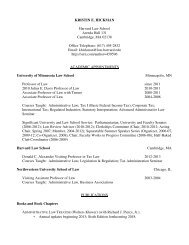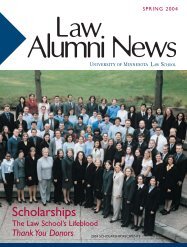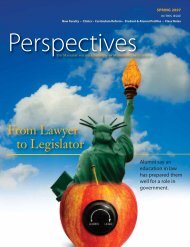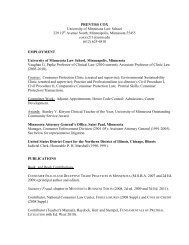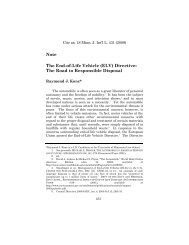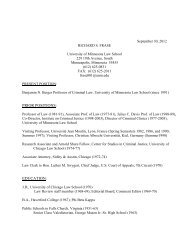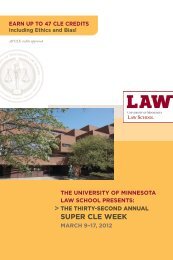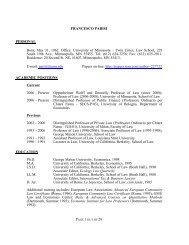Enabling Private Ordering - the University of Minnesota Law School
Enabling Private Ordering - the University of Minnesota Law School
Enabling Private Ordering - the University of Minnesota Law School
Create successful ePaper yourself
Turn your PDF publications into a flip-book with our unique Google optimized e-Paper software.
68 MINNESOTA JOURNAL OF INT’L LAW [Vol. 18:1<br />
<strong>the</strong> parties. 182 Accordingly, <strong>the</strong> violation <strong>of</strong> <strong>the</strong> substantive rights<br />
and obligations contained in an investor-State contract can be<br />
severed from <strong>the</strong> contractual forum selection clause.<br />
Finally, reasons <strong>of</strong> efficiency and expediency militate for <strong>the</strong><br />
overriding effect <strong>of</strong> BIT arbitration. Uniting all claims for <strong>the</strong><br />
violation <strong>of</strong> a BIT, including those contractual breaches brought<br />
under an umbrella clause, supports <strong>the</strong> effective dispute<br />
settlement in a single forum and promotes <strong>the</strong> efficient solution<br />
<strong>of</strong> disputes. 183 These concerns are not outweighed by <strong>the</strong><br />
argument, <strong>of</strong>ten invoked in favor <strong>of</strong> requiring parties to first<br />
seize <strong>the</strong> contractually chosen forum, that <strong>the</strong> chosen forum, in<br />
particular domestic courts, would be better placed to decide<br />
disputes relating to <strong>the</strong> interpretation and application <strong>of</strong> <strong>the</strong><br />
substantive law that governs <strong>the</strong> investor-State relations. The<br />
argument purports that domestic courts, or any o<strong>the</strong>r<br />
contractually chosen forum, would be better placed to decide<br />
contractual questions in <strong>the</strong> context <strong>of</strong> an umbrella clause<br />
violation, because domestic judges have superior knowledge <strong>of</strong><br />
<strong>the</strong> governing law compared to arbitrators sitting at <strong>the</strong><br />
international level. Although this argument has some intuitive<br />
appeal, it does not take into account that <strong>of</strong>ten investor-State<br />
contracts do not primarily turn on intricate questions<br />
concerning <strong>the</strong> interpretation and application <strong>of</strong> domestic law,<br />
but are primarily difficult with respect to <strong>of</strong>ten comprehensive<br />
factual issues. But even if it were true that intricate questions <strong>of</strong><br />
domestic law are decisive for a certain dispute, host State and<br />
investor would be free to appoint arbitrators for resolving <strong>the</strong>ir<br />
dispute in a unitary treaty-based forum that bring <strong>the</strong> requisite<br />
expertise to <strong>the</strong> table. Apart from that, one <strong>of</strong> <strong>the</strong> reasons why<br />
international arbitration has developed as a mechanism to<br />
stabilize investor-State cooperation and enforce promises <strong>the</strong><br />
host State has given is precisely <strong>the</strong> insufficiencies that exist in<br />
domestic dispute settlement. 184 Referring parties to a<br />
contractually chosen forum may thus frustrate <strong>the</strong> very basis<br />
and justification <strong>of</strong> investment treaty arbitration and <strong>the</strong><br />
182. See Weil, supra note 3, at 223.<br />
183. Cf. Christoph Schreuer, Calvo’s Grandchildren: The Return <strong>of</strong> Local<br />
Remedies in Investment Arbitration, 4 The <strong>Law</strong> & Practice <strong>of</strong> Int’l Courts and<br />
Tribunals 1, 12 (2005) (“If competing competences exist, it makes more sense to have<br />
<strong>the</strong> entire dispute heard by one forum, preferably <strong>the</strong> one with <strong>the</strong> most<br />
comprehensive jurisdiction. If <strong>the</strong> terms <strong>of</strong> reference in <strong>the</strong> BIT are broad enough to<br />
include contract claims in addition to treaty claims <strong>the</strong> international tribunal would<br />
be <strong>the</strong> one with <strong>the</strong> broadest jurisdiction.”).<br />
184. See supra Part II.B.1.




